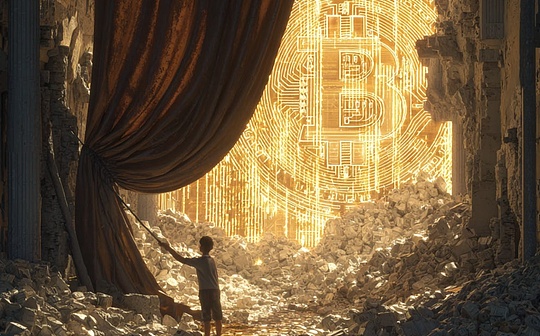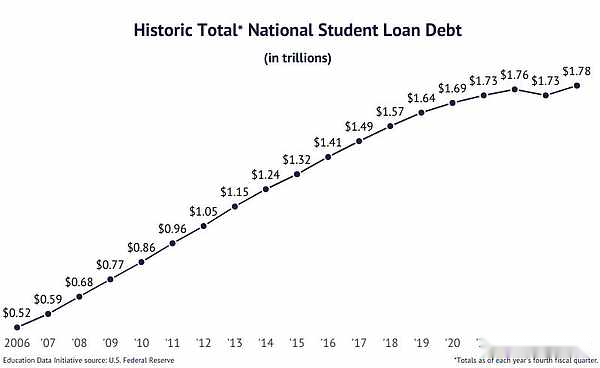
Source: Bitcoin Fortress, compiled by Shaw bitchain vision
For decades, most people have spent their lives in a daze and have never questioned the nature of money.The dollar “is that way”, just like the sun rises from the east – reliable, unquestionably, and people think it’s worth simply because it’s always been.Teachers may have talked about some basic economic concepts in school, but deeper truths about how money works and how it is manipulated rarely appear in the course.
However, now this calm assumption begins to crack.People start asking questions that have never been asked before:
-
Why did my income not increase, but everything rose in price?
-
Why does my savings account feel like a tire is leaking?
-
Why do politicians always talk about “repairing” the economy by printing money out of thin air?
The facts began to make millions realize:The monetary system has collapsed.
Crisis of trust
We are in an era where trust in institutions has fallen to an all-time low.The government and the central bank assured us that inflation is “controlled”, however, the grocery bills show that it is not.
Housing affordability has dropped sharply.

Student loans have left young people with decades of debt.

Many people are beginning to suspect that these problems are not simply caused by bad luck or temporary recession, but are manifestations of deeper structural flaws in the monetary system itself.
The fiat currency model—a monetary system issued by the government and is not supported by any tangible assets—prospers by quietly stealing wealth.Inflation weakens purchasing power year by year, but because this change is gradual, it is often not noticed until it is too late.This is not a loophole in the system, but a design problem.
Bitcoin: The new generation of “red pills”
For many people, Bitcoin was originally just a “network currency”, a strange story for technology enthusiasts or a gambling for speculators.But those who take the time to really understand it quickly realize that Bitcoin is much more than a financial asset—it is a perspective on what it is to look at the world.
Bitcoin forces people to ask questions that traditional systems hope you will never ask:
-
Why can central banks create money without limits, but you have to work to get it?
-
Why is it legal for your savings to shrink due to inflation, but it is illegal for you to choose to exit the system and issue your own competitive currency?
-
Why is privacy and self-keeping, which has been a cornerstone of personal freedom for hundreds of years, now regarded as a suspicious move?
By understanding how Bitcoin works—a fixed supply of 21 million, a decentralized network, censorship resistance—people tend to inadvertently accept a crash lesson on economics, game theory, and political history.
The impact of “Bitcoin Effect” on financial literacy
Bitcoin supporters often joke that Bitcoin is an “introduction drug” leading to the ideas of the Austrian School of Economics.Once you understand the principles that make Bitcoin work, you inevitably start questioning the principles that fiat currencies follow.
You will find a long history of currency depreciation:
-
During the ancient Roman period, silver coins were cut into horns and mixed with cheap metals until their value plummeted.
-
During the Weimar Republic of Germany in the 1920s, the banknote mark became worthless overnight, and the savings were gone, and the middle class was destroyed.
Today, Bitcoin study groups and podcasts explain these courses much more deeply than most college economics courses.People often only need a few hours of self-study to learn more about monetary mechanisms, the history of currency collapse, and the risks of central planning than they have learned in twelve years of formal education.
And that’s more than that – once awakened by Bitcoin, many people began to explore the concepts of privacy, decentralization, sound governance, and personal sovereignty.Bitcoin may have been just a financial instrument at first, but it often serves as a catalyst for deeper thinking about freedom itself.
Are people awakened?
The answer is:Some people are awakening – and this number is still increasing.
Every economic shock—from bank bankruptcy to sudden surge in inflation—has alerted more and more people.Bitcoin adoption rate is rising steadily.Surveysias over central bank policies are growing.The younger generation is already skeptical of traditional institutions and has much higher acceptance of alternative forms of currency.
We are still in the early stages.Most people are still unaware of or are not interested in questioning the monetary system.But the cracks in the appearance are expanding.
Whenever someone learns about Bitcoin, they are exposed to the disturbing fact that the money they spend throughout their lives is not what they think is rock solid—but quicksand.
Conclusion: From awakening to action
Bitcoin not only makes people aware of the problems in the current monetary system, but also shows them a way out.It replaces the despair of aware that a system is manipulated with hopes that a better monetary system may be realized—in which money is scarce, fair, transparent, and not at the mercy of a small group of unelected bankers.
For those willing to take the time to understand, Bitcoin is like a flashlight in a dark room.Once you see what is really there, you can no longer ignore it.Under such a light, more and more people realize that every day,Solving the currency problem is not just a financial need—it is also the basis for solving almost every other problem.






